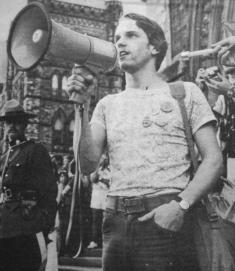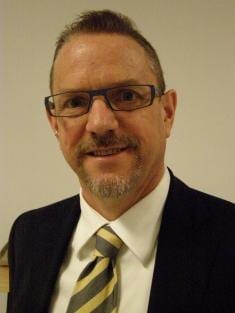
Metcalfe in Ottawa, 1975 Credit: photo by Grant Kayler
In 1975, while standing on the steps of the Peace Tower in Ottawa, Robin Metcalfe was handed a megaphone.
Since then, he’s never stopped talking about queer rights.
This year, Metcalfe is the grand marshal for Halifax Pride, now in its 23rd year. Born in Chester, a small community outside of Halifax, Metcalfe was brought up in a military family and grew up all over the country. In 1975, he came back to the east coast, attending the Nova Scotia College of Art & Design. Taking on the edict that the personal was political, Metcalfe joined the Gay Alliance for Equality (GAE), a local gay rights group, and became active at demonstrations and public meetings. The first time he spoke publicly about gay rights was at a parlimentary hearing on Canada’s ban on gay immigrants.
“At the time, gays were considered undesirable and were paired with epileptics and prostitutes when it came to immigration,” he remembers. While giving his presentation to the parliamentary committee, Metcalfe was interrupted and told that the committee had already heard much of the same information at other sessions across the country. Metcalfe retorted, “Homosexuals have been waiting for a very long time to have a voice in politics, and I was told I was going to have 10 minutes to do a presentation, and I am going to talk for 10 minutes!” In hindsight, he says that may have been a bit sassy of him, but the smirk on his face reveals his pride in his actions.
Two days after the hearings, Metcalfe found himself speaking in public again, this time in the nation’s capital, at a gay rights march on Parliament Hill. “As it turned out, someone stuck a bullhorn in my hand, and I ended up making a speech in front of the Peace Tower,” he says. This was only the beginning for the fast-talking activist.
In the early ’70s, the members of Halifax’s gay community who were politically active may have been small — Metcalfe estimates that there were “a couple dozen” people — but according to Metcalfe, it was very grassroots and diverse, especially along gender lines.
“Halifax was interesting because it was mixed to a greater degree compared to other cities at the time. The founding members of GAE were of varying class backgrounds, mostly women, and had occupations such as day care teachers, to people who worked on the railroad.” For him, the diversity of this tight-knit group was an asset to its success. By 1978, GAE helped organize and host a national conference on gay and lesbian rights in Halifax.
But that was just the start of Metcalfe’s career. He soon began to write for The Body Politic (Xtra‘s predecessor). Halifax had its own problem with a local CBC radio station. In 1976, it refused to play a public service announcement for Gayline, a local support hotline for the gay community. The Halifax station’s decision not to announce PSAs for gay groups soon became a national policy, and Metcalfe and other members of GAE protested in front of the CBC.
Over the years, Metcalfe made a point of collecting all kinds of gay ephemera. He collected everything he could get his hands on, from posters for gay meetings, flyers for parties and swizzle sticks from watering holes to copious amounts of newspapers, clippings and photos. In 1997, he curated a show at Mount Saint Vincent University Gallery, called “Queer Looking and Queer Acting.” The show presented select pieces from his collection, including an early print by photographer Evergon (“He was living in a van at the time, if I remember correctly,” Metcalfe says) to flyers for speakeasies and photos taken during the various gay rights demonstrations in Halifax.
But Metcalfe isn’t stuck in the past. In fact, he is fascinated and inspired by the future of the queer rights movement. “I’d say we’re in the middle of another wave of political activism now in the gay community. I’ve been made aware of very politically active people in their 20s and early 30s who are raising radical questions about the fundamental issues of social and political structures. We’ve now gained most human rights protection — now the focus of the issue is much more on gender and gender identity. Particularly with the emergence of more trans people, and especially female to male trans people, who were virtually invisible in the 1970s. I keep meeting really smart, articulate, politically savvy people in that community.”


 Why you can trust Xtra
Why you can trust Xtra


